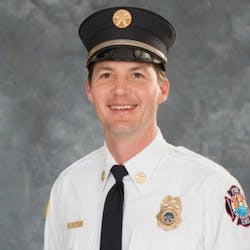WI Battalion Chief Battled PTSD Before Suicide
By Lisa Kaczke
Source Duluth News Tribune, Minn.
April 25 -- A Superior Fire Department battalion chief who retired just a few weeks ago died on April 18 after "a long and brave struggle" with mental illness, Mayor Jim Paine said on Tuesday.
Erik Sutton, 46, who had served on the Superior Fire Department for 20 years, took his own life, Paine said. Sutton had sought and received care prior to his death. Paine said he has offered his condolences and support to the fire department leadership and Sutton's mother.
"We have all agreed that while the price of his service was too high, none of us will allow his death to pass in vain," Paine said in a statement. "We will put his memory to work for our bravest civil servants as diligently as he put his own life to work for all of us and commit ourselves to ensuring that every firefighter and police officer in our service not only has full access to the care that they need, but that they feel the support to seek care when necessary."
Sutton officially retired from the fire department on April 1, although he had been on personal leave before then.
- Martin, Tran, Buser: Depression & PTSD Shown to Be Strongest Predictors of Suicide
Sutton's death is "tragic and horrible," said George Esbensen, president of the Minnesota Firefighters Initiative, a nonprofit that works to improve firefighters' physical and mental health.
"It's very unfortunate for Battalion Chief Sutton, his family and also all of his Superior firefighter colleagues and everybody who knew him and loved him," said Esbensen, who is fire chief in Eden Prairie, Minn.
- Lamplugh: Responding to Your Own Mental Health
In Minnesota, firefighters are twice as likely as people in the general population to take their own lives, which is a complex issue, Esbensen said. He added that suicide among firefighters is "a horrible, horrible problem" that needs to be addressed.
"Firefighters aren't born with some different genetic composition that makes them immune to the rigors of regular life, and then when you pile on top of that the rigors of the life of a firefighter and the kinds of things that firefighters respond to and have to see on a fairly regular basis, that can be, without proper education and prevention strategies, a real toxic environment that people aren't always able to navigate successfully," he said.
To get help:
- Minnesota Firefighter Initiative's 24-hour helpline: (888) 784-6634
- National Suicide Prevention Lifeline: (800) 273-8255
___
(c)2018 the Duluth News Tribune (Duluth, Minn.) Visit the Duluth News Tribune (Duluth, Minn.) at www.duluthnewstribune.com Distributed by Tribune Content Agency, LLC.






